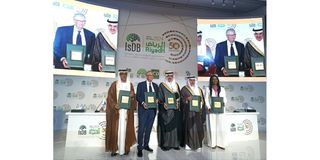Islamic Development Bank wants entrepreneurial leaders nurtured

IsDB President, Dr Muhammad Al-Jasser with renowned billionaire and philanthropist Bill Gates (second left), and other global leaders during the launch of the annual report. PHOTO | COURTESY
What you need to know:
- Dr Al-Jasse linked the spirit of entrepreneurship to the realm of Islamic finance, noting that Prophet Muhammad (SWA) himself was a successful entrepreneur, embodying the qualities of trustworthiness, risk-sharing, and a commitment to the betterment of society.
Riyadh. The Islamic Development Bank (IsDB) has called for the need to nurture entrepreneurial leaders to help propel the world towards a future rooted in ethical principles and sustainable development.
The bank made the call during the 18th Global Islamic Finance Forum recently held in Riyadh, Kingdom of Saudi Arabia.
The forum attracted an array of thought leaders, policymakers, financial experts, and major stakeholders in the Islamic finance industry.
It was also held on the sidelines of the IsDB Group Annual Meetings and Golden Jubilee Celebration, themed: Innovation, Entrepreneurship, and Leadership in Islamic Finance.
In his opening remarks, IsDB President Dr Muhammad Al-Jasser highlighted the impact of entrepreneurship on both individual and global economies.
He cited examples of enterprises that have created immense value for people worldwide, such as Alibaba, Alphabet, Amazon, Apple, Microsoft, Nvidia, and Tesla.
“The combined current market value of these companies is almost $12 trillion, which exceeds the 2023 economic output of the UK, France, and Russia combined,” he said.
He also pointed out the disparity in new business creation rates between high-income and low-income economies and stressed the need to address the existing gap by fostering a conducive environment that supports, and nurtures entrepreneurship.
Dr Al-Jasser suggested that initiatives such as microfinance, tailored to comply with Islamic financial principles, could be pivotal in this respect.
He also linked the spirit of entrepreneurship to the realm of Islamic finance, noting that Prophet Muhammad (SWA) himself was a successful entrepreneur, embodying the qualities of trustworthiness, risk-sharing, and a commitment to the betterment of society.
“When financial institutions are grounded in these principles, they can effectively promote ventures that contribute to sustainable growth and empower potential entrepreneurs,” he added.
The forum went concurrently with the issuance of the 2023 Annual Report and showcased its activities and accomplishments in Islamic finance transformation and creative solutions for sustainable development.
The report covers the Institute’s accomplishments in key functional areas that include leading the Islamic finance sector’s transformation and synergizing knowledge technologies with Islamic finance.
Others are building human capital in Islamic finance and development and publishing in Islamic economics and finance.
“Further, the report documents the institute’s leadership role in developing Islamic finance ecosystems globally through the Islamic finance grants programme, under which 14 new projects worth about $2.3 million were approved in 2023,” reads another statement to this newspaper.
According to the document, the report highlights the institute’s flagship projects that leverage Islamic finance and technology to create strategic and holistic solutions for development challenges.
“These are Awqaf-free zones, the OIC smart countertrade system, the digital postal Islamic financial services project, and the Islamic finance sector mapping framework,” reads another part.
In the area of fostering the development of human capital, the report showcases the accomplishments in the delivery of training programmes and e-learning courses that have benefited thousands of professionals around the world.
The report documents the Institute’s work in developing fintech solutions to address challenges facing IsDB member countries.
These include the smart stabilisation system, the Islamic finance artificial intelligence assistant, and the Islamic finance pavilion marketplace.




